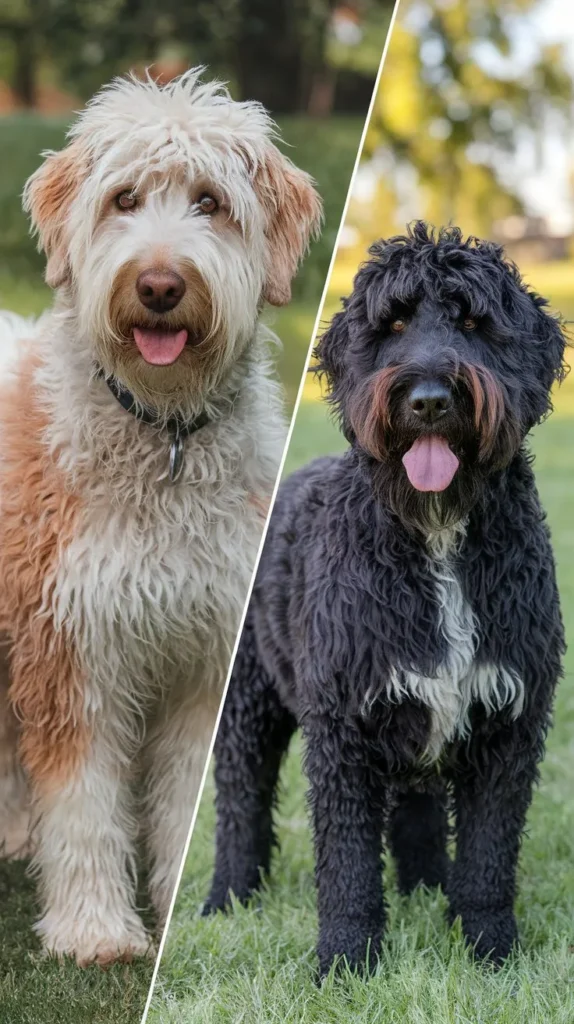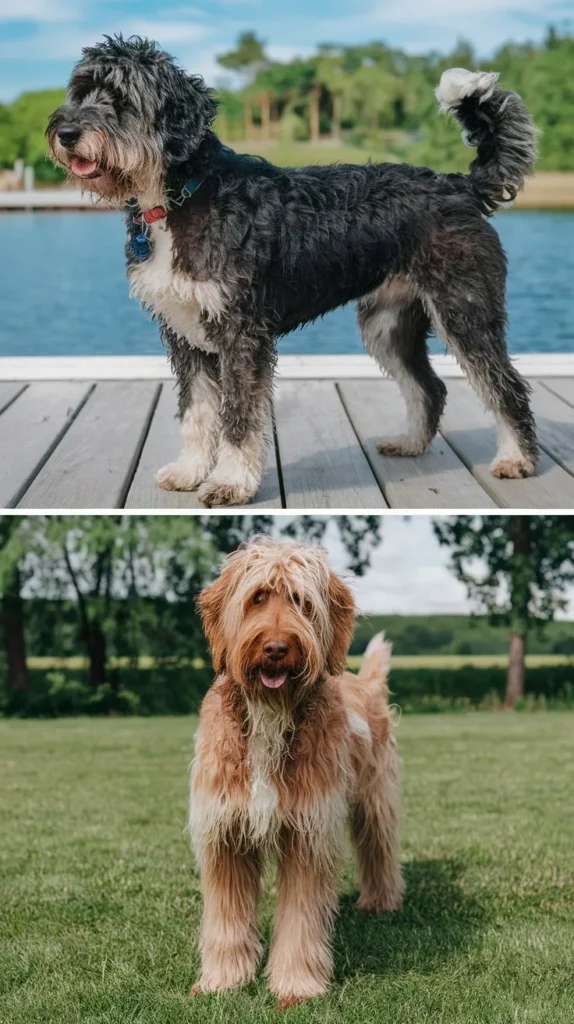Portuguese Water Dog Vs Labradoodle: Which Breed Reigns Supreme?
As you consider bringing a new furry friend into your life, you’re likely weighing the pros and cons of two popular breeds: the Portuguese Water Dog and the Labradoodle. Both have their unique strengths and weaknesses, but which one is right for you?
On one hand, Portuguese Water Dogs are high-energy companions that thrive on structure and obedience, while on the other hand, Labradoodles are adaptable and laid-back, but may require more patience during training.
Which breed aligns best with your lifestyle and living situation? Let’s explore these differences in more depth to find out.
In a Nutshell

- Portuguese Water Dogs are high-energy working dogs requiring intense exercise and mental stimulation, whereas Labradoodles are more laid-back and adaptable.
- Portuguese Water Dogs have a curly or wavy coat that sheds very little, making them ideal for those with allergies, whereas Labradoodles shed moderately.
- Portuguese Water Dogs are highly trainable with a strong work ethic, responding well to positive reinforcement training, whereas Labradoodles can be more challenging to train.
- Both breeds require early socialization to develop good manners and confidence, with Portuguese Water Dogs needing more intense social circle exposure due to their high energy levels.
Origins and History Compared

As you explore into the world of Portuguese Water Dogs and Labradoodles, understanding their origins and history is crucial, and a comparison of their roots reveals distinct differences that have shaped these breeds into what they’re today.
Portuguese Water Dogs have ancient ancestors that date back to the 12th century, originating from the Algarve region in Portugal.
They were bred as working dogs, assisting fishermen by herding fish, retrieving broken nets, and acting as messengers between boats and shore.
Their exceptional swimming abilities and water-resistant coats made them ideal companions for seafarers.
Over time, they became royal companions, serving as loyal friends to Portuguese monarchs.
In contrast, Labradoodles are a relatively new breed, developed in the 1980s as a cross between a Labrador Retriever and a Poodle.
They were initially bred to create a hypoallergenic guide dog, but their popularity soon grew as a family pet.
While they don’t have the same ancient heritage as Portuguese Water Dogs, their parent breeds have a rich history, with Labradors originating from Canada and Poodles from Germany.
Temperament and Energy Levels

When considering a Portuguese Water Dog or a Labradoodle as a pet, you’ll want to think about their temperament and energy levels, as these factors will substantially impact your daily life.
You’ll need to assess how much exercise and mental stimulation you can provide, as well as your ability to establish clear boundaries and socialize your dog effectively.
Energy Level Comparison
You’ll likely notice a distinct difference in the energy levels of Portuguese Water Dogs and Labradoodles, with the former bred to be high-energy working dogs and the latter often inheriting the laid-back nature of their Labrador Retriever parent.
As a result, your daily routines will substantially impact the compatibility of these breeds with your lifestyle.
Portuguese Water Dogs require regular, intense exercise to keep them physically and mentally stimulated. They thrive on active playtime, such as swimming, running, or agility training, and need at least an hour of exercise daily.
In contrast, Labradoodles tend to be more laid-back and adaptable, requiring around 30-60 minutes of moderate exercise per day.
During playful moments, Portuguese Water Dogs can be quite intense, while Labradoodles are generally more relaxed.
If you’re an active person who enjoys outdoor activities, a Portuguese Water Dog might be the perfect companion. However, if you prefer a more relaxed pace, a Labradoodle could be a better fit.
Trainability and Focus
Frequently, Portuguese Water Dogs and Labradoodles exhibit distinct trainability and focus characteristics, largely influenced by their unique temperaments and energy levels.
You’ll find that Portuguese Water Dogs are known for their high intelligence and strong work ethic, making them highly trainable. They thrive on structure and clear obedience commands, responding well to positive reinforcement training.
On the other hand, Labradoodles, being a cross between a Labrador Retriever and a Poodle, can be more challenging to train due to their independent nature. They require consistent, patient training and may need more time to master obedience commands.
One significant difference between the two breeds is their attention span. Portuguese Water Dogs have a longer attention span, allowing them to focus on tasks for extended periods.
Labradoodles, however, can get distracted easily and may need more frequent breaks during training sessions.
Understanding these differences is vital when developing a training plan that suits your dog’s unique needs. By recognizing their strengths and weaknesses, you can create a training approach that brings out the best in your Portuguese Water Dog or Labradoodle.
Socialization Needs
As you tailor your training approach to your dog’s unique needs, it’s equally important to weigh their socialization requirements, which are heavily influenced by their temperament and energy levels.
Both Portuguese Water Dogs and Labradoodles require early socialization to develop good manners and confidence.
However, the Portuguese Water Dog’s high energy levels and strong herding instincts mean they need more intense social circle exposure, especially during puppyhood.
This breed thrives on structure and clear boundaries, so puppy party attendance and controlled socialization sessions are vital.
In contrast, Labradoodles are generally more laid-back and adaptable, making them more forgiving of socialization mistakes.
Nevertheless, they still benefit from early exposure to various environments, people, and experiences.
A well-socialized Labradoodle will be more confident and calm in new situations.
Regardless of breed, it’s vital to remember that socialization is an ongoing process that requires consistent effort and attention.
Grooming Needs and Coat Types

Two breeds with distinct coat types, the Portuguese Water Dog and Labradoodle, require different grooming approaches to keep their unique features in top condition.
As you consider bringing one of these breeds into your life, it’s vital to understand their coat maintenance needs.
The Portuguese Water Dog has a curly or wavy coat that sheds very little, making it an excellent choice for those with allergies. However, their coat requires regular brushing to prevent matting and tangling.
You’ll need to brush them at least twice a week, with daily brushing during shedding season.
On the other hand, the Labradoodle has a coat that sheds moderately, and their grooming needs vary depending on the generation of the dog.
You can expect to brush them at least three times a week, with daily brushing during shedding season.
Be prepared for regular trimming and clipping to keep their coat looking its best.
Exercise and Training Requirements

When considering a Portuguese Water Dog or a Labradoodle as your new pet, you’ll want to think about the exercise and training requirements that come with these breeds.
You’ll need to provide your dog with regular physical activity to keep them happy and healthy, as well as mental stimulation to prevent boredom and destructive behavior.
As you research these breeds, you’ll discover the specific daily exercise needs, socialization strategies, and training approaches that work best for each.
Daily Exercise Needs
Your Portuguese Water Dog and Labradoodle both require regular physical and mental stimulation to thrive, and understanding their daily exercise needs is crucial for their overall health and happiness.
As a responsible pet owner, providing them with adequate exercise is imperative to prevent boredom, obesity, and destructive behavior.
A 30-minute walk in the morning helps to burn off excess energy and sets a positive tone for the day, which is why morning strolls are essential.
Take them on evening jogs or play fetch for at least 20 minutes to keep them physically active and mentally engaged.
Provide plenty of opportunities for free play, such as running, chasing, or playing with toys, for at least an hour.
Consider swimming or hiking sessions, which can be an excellent way to challenge your dog physically and mentally.
Mental Stimulation Required
As you work to meet your Portuguese Water Dog and Labradoodle’s physical needs, don’t overlook their mental stimulation requirements, which are just as crucial for preventing boredom, stress, and behavioral problems.
Both breeds are intelligent and curious, and they need mental exercises to stay happy and healthy.
You can provide mental stimulation through cognitive games, such as hide-and-seek, scent work, and problem-solving activities.
These games challenge your dog’s brain, keeping them engaged and focused. For example, you can hide treats or toys and encourage your dog to find them, or create obstacle courses that require problem-solving skills.
Mental stimulation can also be achieved through interactive toys and puzzle toys filled with treats.
These activities not only prevent boredom but also strengthen the bond between you and your dog.
By providing mental stimulation, you’ll notice a significant reduction in destructive behavior, anxiety, and stress.
Socialization Strategies
Both Portuguese Water Dogs and Labradoodles require early socialization and consistent training to become well-adjusted, well-behaved companions.
As a responsible dog owner, you play a vital role in shaping your dog’s social skills and behavior. To achieve this, you’ll need to invest time and effort in socialization strategies.
Social Circle Expansion: Introduce your dog to various people, ages, and backgrounds to help them become confident in new situations.
Host a Puppy Party Planning event, where you invite friends and family with their pets to socialize with your dog in a controlled environment.
Take your dog on outdoor adventures, such as walks, hikes, or trips to the beach, to expose them to new sights, sounds, and experiences.
Enroll your dog in puppy classes or group training sessions to teach them basic obedience and social skills.
Health and Potential Issues

Genetics play a crucial role in determining the health and potential issues of your Portuguese Water Dog or Labradoodle.
As a responsible owner, it’s imperative to be aware of the potential health concerns that can affect your pet.
When it comes to eye problems, both breeds can be prone to issues like progressive retinal atrophy and cataracts. Regular eye check-ups can help identify these problems early on, and in some cases, surgery may be necessary.
Hip dysplasia is another common issue in both breeds, which can lead to arthritis and mobility problems if left untreated. Keeping your pet at a healthy weight, providing regular exercise, and considering joint supplements can help minimize the risk of hip dysplasia.
Additionally, responsible breeding practices can also help reduce the incidence of these health issues.
Family and Living Situation Suitability

When pondering bringing a Portuguese Water Dog or Labradoodle into your family, you’ll want to assess whether your living situation is suitable for an energetic breed that requires regular exercise and mental stimulation. Both breeds thrive in active households where they can receive the attention and engagement they need.
Some key factors to ponder when evaluating your family’s suitability for a Portuguese Water Dog or Labradoodle:
Household size: Portuguese Water Dogs and Labradoodles are adaptable to various household sizes, but they do require space to move around. A smaller living space may be suitable if you’re an active owner who can provide regular outdoor exercise.
Family dynamics: Both breeds are excellent with children, but they do require consistent training and socialization. If you have a busy schedule or multiple young children, you may need to contemplate enlisting additional help with dog care.
Yard and outdoor space: While both breeds can thrive without a yard, they do require regular outdoor exercise and mental stimulation. A securely fenced yard or access to nearby parks and trails is ideal.
Activity level: If you’re an active person who enjoys outdoor activities, either breed can be a great companion. However, if you’re relatively sedentary, you may want to ponder a lower-maintenance breed.
Frequently Asked Questions
Do Portuguese Water Dogs Make Good Therapy Dogs?
You’ll find that Portuguese Water Dogs make excellent therapy dogs, thanks to their ability to form strong emotional connections with people and their inherently calm nature, which helps create a soothing atmosphere.
Can Labradoodles Be Used for Hunting and Retrieving?
You’re wondering if Labradoodles can handle hunting and retrieving? They can, especially for bird hunting and water retrieval, thanks to their Labrador Retriever heritage and strong instincts for chasing and fetching.
Are Portuguese Water Dogs Naturally Protective of Family?
You’ll find that many breeds, including Portuguese Water Dogs, possess natural protective instincts, making them excellent Family Guardians. Their loyalty and devotion to their pack trigger strong protective instincts, ensuring your family’s safety and well-being.
Do Labradoodles Require a Lot of Socialization as Puppies?
You’ll find that puppies, regardless of breed, need thorough socialization to prevent social anxiety. A well-socialized puppy temperament is key, so expose them to various environments, people, and experiences to help them grow into a confident companion.
Can Portuguese Water Dogs Thrive in Small Living Spaces?
You can successfully raise a Portuguese Water Dog in a small living space, ideal for urban dwellers, as they’re adaptable to apartment living and don’t require a massive backyard, but they do need regular exercise and mental stimulation.














Hi, I’m Ella Frost, a devoted animal lover working at CuddlyCreatureCare.com. My passion for animals drives me to share my knowledge through comprehensive guides on animal care and rescue. I’m here to help you understand and care for your furry friends better.







